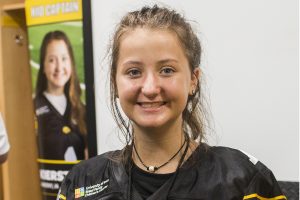Digital program finds gaps in students’ reading ability
Foundations in Learning launches iASK, an online screener and diagnostic tool for struggling readers to identify specific areas of need for struggling readers in middle school.
Dr. Carolyn Brown and Dr. Jerry Zimmermann discuss their recent project at Maggie’s Farm Wood-Fired Pizza on Tuesday, September 18, 2018. The new tool is used to assist middle schooler who struggle in reading comprehension.
September 20, 2018
After years of research, Foundations in Learning launched a new program to help children become better readers on Sept. 4.
The Iowa Assessment of Skills and Knowledge, or iASK, is a two-step process of screening and diagnostics. Students take an assessment that identifies gaps in reading, which is sent to teachers. They can then shift their teaching strategies to better help the students.
The program has been a culmination of efforts among various departments at the University of Iowa, surrounding areas, and across the country to validate the research that has been going on for more than a decade in order to help children learn how to read proficiently, said Carolyn Brown, the president of Foundations in Learning.
RELATED: UI researchers aid in learning ability research
Throughout the process, researchers paired with middle schools to set the program in action. They tweaked iASK, sent it back, and eventually came up with the right fit, said Jerry Zimmermann, the vice president of Foundations in Learning.
Many people played a role in the research, including UI Associate Professor Deborah Reed, who works with adolescents who have reading difficulties, and their instructors.
“My primary responsibilities were to A) evaluate how students responded to and interacted with the gamified assessment, and B) to evaluate how teachers perceived the usability and feasibility of the assessment,” Reed said in an email to *The Daily Iowan*.
Brown said iASK began 15 years ago because of the need to help struggling young readers. It was completed in the spring of 2017, she said.
“We have exploited technology in order to build learning principles into both the assessment and the intervention,” Brown said.
With two-thirds of middle-school children not being adequate readers, according to the National Assessment of Education Procurement website, Zimmermann said it’s obvious that there must be a better way of learning.
“Educators have focused on what students know at the expense of how they learn,” he said.
Brown said iASK is different from other assessments because the model focuses on how students learn instead of merely looking at what students are learning.
“IASK gives teachers detailed information about what [students] know about sound-symbol relationships and how they use this knowledge to read words,” she said. “IASK [then] provides a detailed profile for each student that identifies specific gaps in foundational reading skills so teachers can target the most appropriate intervention.”
Bob Davis, the principal of Crossroads Park Elementary School in West Des Moines, vouched for the reliability of iASK and how it has been implemented.
“Research shows high reliability of predicting reading failure, and there is nothing like this available in the country,” he said.
Davis, who has a long-standing relationship with Foundations in Learning, said he has faith in Brown and Zimmermann and what they are trying to achieve through iASK.
“They are two of the best researchers in the country,” he said.
Editor’s note, 9/24/18: This article has been updated to reflect that iASK is a two-step process of screening and diagnostics. The Daily Iowan originally wrote “The Iowa Assessment of Skills and Knowledge, or iASK, is a three-step process of screening, diagnostics, and intervention.”






